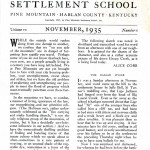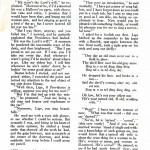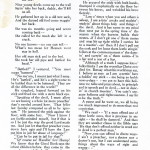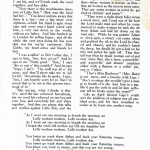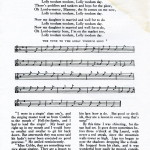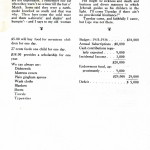Pine Mountain Settlement School
Series 09: BIOGRAPHY
Series 17: PMSS PUBLICATIONS
Series 30: MUSIC
ALICE COBB STORIES
The Ballad Singer
from PMSS “Notes”
November 1935

NOTES – 1935 November, page 5. [PMSS_notes_1935_nov_005.jpg]
TAGS: Alice Cobb Stories, The Ballad Singer, PMSS Notes Nov. 1935, Alice Cobb, Lige Jackson, Lolly Toodum, Little Brit;, Lexine Baird;, Medical Settlement at Big Laurel, Little Laurel
ALICE COBB STORIES The Ballad Singer PMSS Notes Nov. 1935
Introduction
Of ballad singers, the Pine Mountain Valley knew many. Some were more famous than others but they all shared what Evelyn K. Wells in her book The Ballad Tree (1950) describes as a kind of poetry of folkways. where the singers live “close to the realities of existence” — where entertainment depended on the individual’s own resources.
It was moreover natural for him to sing, for the lines of the ballads slipped from his tongue like his own spoken language. What is poetry to us was his natural expression, and words which seem to us archaic, or illiterate, or poetic, were his daily speech. As his tunes belonged to the usage of a bygone day, rejected by the literate, so did his daily speech. It is of course not a new discovery that dialect was once polite speech.
[…] The ballad’s directness of action is as familiar to the singer as its diction. For the mountaineer, a situation needs not comment, but doing. He kills his man as quickly as Lord Dannel, he acts without the law like the borderer he steals his wife from an enemy clan as gallantly as the hero of ‘The Gay Goshawk.’ He is satirical about human frailty as any past singer of ‘The Farmer’s Curst Wife,’ and as fatalistic as Edward about those things “which will never be, be, be.”
And sometimes he gives a gift or takes one away as he drives home his message. The following excerpt from the bi-annual Notes of the Pine Mountain Settlement School sent to the friends and donors to the School, subtly explores the worlds of “insider” and “outsider.”
Transcription: ALICE COBB STORIES PMSS Notes Nov. 1935
Page 1 – [PMSS_notes_1935_nov_001.jpg]
THE BALLAD SINGER [Lige Jackson]
While the outside world rushes along from one decade to another, we confess that we “on yon side of the mountain” are in danger of forgetting how rapidly you travel. Perhaps some of you do not know that back here, even now are a people actually living in a century you have long left behind. We at Pine Mountain are not yet brought face to face with your city housing problem, your unemployment, sweatshops, and strikes, but we have the old problem of awakening and strengthening our people to meet the flood of progress which must eventually penetrate even these fastnesses.
In the meantime, we have to combat, a manner of living, ignorance of the law, our moonshining, and our primitive religion. (The Holiness sect, rather unfortunately celebrated as the “fire carrying and snake handling church,” is not the only religious group of the mountains, of course, but it has a decidedly unwholesome influence in our section.) And we have the tremendously thrilling problem of finding and fostering traces of that innate culture, which we speak about so often — sometimes in a rare pattern of weaving, or an unusual shade of the vegetable dye, sometimes in a form of the dance, preserved here and lost to all the rest of the world, or in a snatch of song, or a bit of a tune, sometimes only in an odd turn of a phrase in some individual’s manner of speaking. Lige Jackson would say “that war the mother-wit!”
The following sketch was noted in shorthand and transcribed word for word from an afternoon with one of our neighbors. It is printed for the charm of the character, and also as a rather accurate picture of life down Greasy Creek, as it is being lived today.
ALICE COBB
THE BALLAD SINGER
It was Sunday afternoon in November, and word came up the hill to the settlement house [Medical Settlement at Big Laurel] by Sally Bell, Si Turner’s middling one, that Lige Jackson had limped over from the head of Big Laurel Creek. Even as far away as the school it had got rumored about that Lige had “fit” one of the younger boys who called him a cliff rat, and had been in bed since with jitters and nervous chills and a weak heart and a black eye and other troubles. It was pleasant then to hear that he was up and singing. A few minutes later he did come, smiling in all good humor, and sweetly unembarrassed over his failure to be at the settlement the preceding Thursday night when he was to have sung ballads for me.
Now I was surprised and distressed, for whereas he had been before the battle quite a handsome appearing old gentleman, and well preserved for his fifty-five years, as he himself modestly admitted, now he looked drawn and withered, and leaned heavily upon his stick.
“I am that battered up that I’m a more horrid sight in under the sun than I every…
Page 2 – [PMSS_notes_1935_nov_002.jpg]
was,” he observed ruefully. “I am completely broke and ailing.”
I with delicacy refrained from inquiring about the battle, and being more concerned with his broken promise, mentioned that a bit severely. He opened his black eyes wide and looked at me with most genuine mild surprise.
“Hit warn’t the Lord’s will,” he explained. “Howsoever be, if I’d a-knowed hit war a Hallowe’en party, with chocolate cake and cokie, I promise that I would have been thar, and brung my old woman also, and her singing as good as a bird o’ the ar; but I never heered till hit war too late!”
“But I was there, anyway, and you failed me,” I insisted, and he patiently explained that Providence had faulted. “Hit war the Lord’s will!” A moment he pondered the inscrutable ways of the deity and then brightened. “But I am proud to see you out. If I was you I’d take out every day. And whenever I warn’t going I’d be studyin’ about where to go. Like my eldest boy. I tell him whenever he ain’t settin’ down he is lookin’ fer some good place to set!”
Beaten before I started, and not surprised either, I conceded the point and turned my attention to the real object of my visit down Greasy.
“Well then, Lige, if Providence is willing, suppose you sing for me now!”
“But I’m that tied up with the misery,” he protested. “And me being a old man and hoarse and onpleasant to the yar!”
“Nonsense, Lige, you sing beautifully.”
He eyed me with a wary side glance, to see whether I could be serious. But certainly, I was, and being in his heart of the same opinion, he smiled a broad smile that showed all the teeth he had and the gaps between, — spat accurately at the center of the doorway, and broke suddenly into song before I could grasp my pencil.
“Oh short and long it is my song.
Through this grove I march along.
I met a fair damsel neat and clean;
She made me think of anything.
Tum ratteray, tum ratterray,
tum ratteray
Tum di do dum.
“So well you girls don’t take me wrong
For you asked me to sing a song
And I asked what I might sing
And your reply was anything.
Tum ratteray, tum ratteray,
tum ratteray
Tum di do dum.”
[**Cobb noted that this song was half-chanted, half-spoken.]
“That were an introduction,” he said modestly. “I have got a store of song ballets, and I have forgot more as you could put in a wash tub, but I aim to sing you as good as I am able, me being so onpleasant to hear. Now would you be pleased with something foolish, or would hit pleasure you fer me to sing a sorrowful tune?”
I asked for a foolish one first. Lige hitched up the suspender to his jeans with a flourish, spat again between the two front teeth, took a tight grip on his stick and sang out shrilly:
“One day an old man went out to a
field to plow,
The devil flew over his old gray mare.
Sin ta o ra tel ding ding ding
Sin tal o ra tel ding dey.
He dropped his lines and broke in a
run —
Said the devil’s coming after my oldest
son.
Sing ta o ra tel ding ding ding, etc
Oh law, hit’s not your oldest son
Hit’s your sarned old, ill old, scolding
wife.”
[**Note: This is given in several variations of both words and tune in the Cecil Sharp collection. English Folk Songs from the Southern Appalachians.]
“Wait!” I burst into the torrent of tune. “What was that word — did you say ‘darned’?”
“No’m, hit is ‘sarned’ —‘sarned,” (this very curtly) “And if you was a married woman ‘stead of single and without a knowledge of sech goings on, you would know that a sarned old wife is about the wust thing fer a woman to be. Hit’s worsen or mean, and worsen or ill-natered. Hit’s “sarned!” He paused, to see if he had made himself clear, and then went on.
“Oh take her on with all your heart —
I hope to my soul you never part!
Page 3 – [PMSS_notes_1935_nov_003.jpg]
“Nine young devils run round their
chains
Shakin’ with a poker to addle her brains
Four young devils come running by
She up with her foot, kicked four in
the fire
Nine young devils come up to the wall
Sayin’ take her back, daddy, she’ll kill
us all.
He gathered her up in an old tow sack,
And the darned old fool come waggin’
her back.
She was six months going and seven coming back —
She called fer the mush she left in a crack.
No one knows — no one can tell —
What’s too mean fer Heaven won’t
stay in hell.
Her old man sick and in the bed.
She took her old pipe and battled his
head.”
“Battled?” I ventured. “You must mean ‘battered’.”
“No, ma’am, I meant just what I sung. Hit’s ‘battled’, and hit’s a sight worse to be battled than to be battered. They are all the difference in the world!”
He coughed, leaned forward on his stick and fixed me with a stern black eye.
“Speaking of the devil, I must allow we are having a whole lot more preachin’ than’s needed around here. That feller last Sunday computed us all to be ignorant,” He jammed the stick against the floor, with some fury. “Now I know I am feeble-minded myself, but if that is so I be just the way the good Lord made me. And just let that thar preacher come down here agin and I’ll have the Law put him in jail fer abuse of language!”
“Can he be put in jail for that?”
“Of course so! Handlin’ fire! Hump! We know that the Good Book says the infant children before they come to the yars of accountability be like unto the angels in heaven. Give a leetle child a coal o’ fire and he’ll start to squealin’ every time — and you know and will agree that preachin’ Jim Hensley with upards o’ sixty yars on him ain’t better nor a angel! Handlin’ fire!
“And them a dancing — in the church house! Done the hoe-down as rapid as ever I could when I war sixteen yar old. Now, Miss Cobbs, I believe a body by rights ought to be umbel before the Lord all the time. Of course when our minds is on the acts and deeds that applies to the world we fail to be umble.”
He grasped the stick with both hands, thumped it emphatically on the floor between his knees, and wrinkled his brow fiercely.
“Lots o’ times when you and others is asleep, I am a-lyin’ awake and studyin’ —studyin’ about things holy and things o’ the devil. And it has come to my mind that next yar in the spring time o’ the season when the hornets builds their nestes — if I don’t git one o’ them nestes and stop hit up tight whilst I carries hit to a meetin’ — an’ then if I don’t pull out the cork and let loose them leetle stingin’ fellers at the commencement o’ the dancin’ and carryin’ on o’ them saints — I’m a liar and a son of a liar.
“Although of a truth I suppose lots o’ folks thinks I am the worst liar Christ ever died fer. But say what this world may say, I believe as sure as I am a -settin’ here a-holdin’ my stick — me being so feeble now-a-days — we got to have this holiness we talks and prays about, in principle and in speech and in deed — not in dancin’ in church meetins’. You cain’t separate holiness and righteousness. I say hit to be the truth.”
A pause and he went on, we all being too much impressed to do more than nod conviction,
“We read — ‘If a man offend one of these leetle ones, that is precious in my sight — he shall be damned’ And then they are another clause in the Bible says ‘He that don’t offend neither in word nor in deed is a perfect man.”
“Now, you can offend in divers ways — I ain’t a preacher, nor a doctor nor a doctor’s son, but I can understand some things about the ways of right and wrong —”
“Lige, indeed you do! I broke in.
“You ought to go over to the church house and preach.”
He waved me aside, and I saw that I had interrupted in the midst of a paragraph.
“Knowledge cometh by hearing. How shall he preach onless he be called? I had
Page 4 – [PMSS_notes_1935_nov_004.jpg]
rather be a good civil man as a preacher. I ain’t good, and not much of civil either, but I never stoled nothing in my life that were too big to carry off, or too hot to touch. And now when I sees another man that’s like me, not wantin’ to harm ary feller creature — he’s my friend, and I am is, and we’ll both wade the mud together and fare alike.
“Now there is this troublesome sityation of LIttle Brit.” (Brit was the local bad boy.) “You know and are aware that there is a boy — not a day more over eighteen — which his hand is agin every man and every man’s hand raised agin’ him, a very cast down in the world, without ary father. And him fotched up to London fer selling liquor, and all the while the very ones doing hit has sons that was his reg’lar customers. Miss Cobbs, my heart aches and bleeds fer him.
“I was a-talkin to Brit ‘other day. I says to him, ‘Son, how air ye?’
And he says to me ‘Pretty good.’ ‘Son,’ I says ‘Air ye out o’ this trouble? And he says ‘Nope, I ain’t. The stuff war all o’ hit mine, and they’ll shore take me to jail fer hit.’ Dreadsom like he spoke. I says, ‘Son, I am heartily sorry fer ye. But I’m proud that ye’re out at this present time, stead of in.’
“But ma’am, what I thinks is this. We need the law enforced hereabouts, but we need hit enforced on my boy and your boy, and everybody fair and share together. And they are plenty that talks and testifies against Little Brit, and the very ones that hogged down on him has got plenty to do at home. I say they’d be kept good and occupied a-sweepin’ their own kitchen floors! Oh, well, I will agree that Brit does a sight too much talkin’ hisself. I reckon his mouth must be as big as Dan’l Wilson’s cave. But then — these women is worsen as him — they air worsen as the men in most cases. They are some women as never do get tired of chinnin’ and jawin’!
“They were a right sharp feller wrote a novel onct, and I read out of hit how the Lord made man and when he commenced to make a woman he tuck the rib from Adam and lid hit down on the road side. While he was puttin’ Adam to sleep agin, a ornery cur come along and grabbed the rib so the Lord he chased and chased, and he couldn’t ketch the dawg, but finally he got a-holt on his tail, and pulled hit right off. That thar tail was what he made woman out of and ever since then she’s been a-grumblin’ and a -growlin’ and abusin’ mankind either with a flatiron or a rollin’ pin, one or t’other.
“Thar’s Miss Bard now” (Mrs. Baird [Lexine Baird] is our nurse, and a favorite with Lige.) “She’s so stingy she wouldn’t give a man ar to breath ef’n she had him in a jug. She’d put the cork in an let him suffocate tell he broke outen the vessel!”
Like an April shower Lige’s wrath over the problem of religion was all vanished away, and his face wreathed in smiles as he burst into another song.
“As I went out one morning to breath the morning air
Lolly toodum toodum, Lolly toodum day.
As I went out one morning to breath the morning air
I heard the cruel old mother say Oh my daughter fair
Lolly toodum toodum, Lolly toodum day.
You better to wash them dishes and hush your flattering tongue,
Lolly toodum toodum, Lolly toodum day
You better go wash them dishes and hush your flattering tongue
You know you want to marry, and that you are too young
Lolly toodum toodum, Lolly toodum day.
If you were in the notion, where would you get your man?
Lolly toodum toodum, Lolly toodum day.
If you were in the notion, where would you get your man?
Oh Lord-a-mercy, Mammy, I’d get that handsome Sam
Lolly toodum toodum, Lolly toodum day.
Page 5 – [PMSS_notes_1935_nov_005.jpg]
There’s doctors and lawyers and men of all degree,
Lolly toodum toodum, Lolly toodum day.
There’s doctors and lawyers and men of all degree,
And some wants to marry, and some will marry me.
Lolly toodum toodum, Lolly toodum day.
There’s peddlers and tankers and boys for the plow
Lolly toodum toodum, Lolly toodum day.
There’s peddlers and tankers and boys for the plow
Oh Lord-a-mercy, Mammy, the fit comes on me now,
Lolly toodum toodum, Lolly toodum day.
Now my daughter is married and well for to do
Lolly toodum toodum, Lolly toodum day.
Now my daughter is married and well for to do
Oh Lord-a-mercy, I’m on the market too,
Lolly toodum toodum, Lolly toodum day.
[THE TUNE TO THE LOLLY TOODUM SONG (Image of musical notes; see above)]
[**Note from Alice Cobb: “As far as we know, words and tune of the ‘Lolly Toodum’ song have not been published before. Lige brought the song, he says, from Letcher County, and it is well known now in our settlement neighborhood.”]
“I were in a singin’ class onc’t , and the singing master took us from Cutshin to the mouth o’ Hell-fer-Sartin, and I had to lead the singin’. My heart got right up in my mouth and I wold have to swaller and swaller to git hit back down, But atterwards they was some said hit hadn’t never been executed so good previous.” He smiled reminiscently.
“Miss Cobbs, they are something very nice about singing. They are a lesson to be larned from every song that’s sung. If hit’s a bad song, a man kin larn how not to do, and if hit’s a good song a man kin larn how to do. But good or devilish, they are a lesson in every song that’s sung!”
By this time I was shivering, for the sun had set. It goes down sometimes before three o’clock at Big Laurel, with never a red streak, since the mountain walls tower so high. Lige too began to note the shadows dropping like a cloak. He hopped from his chair, and it was wonderful how easily he moved, considering the much discussed age and infirmity.
“Now what do you think about me so
Page 6 – [PMSS_notes_1935_nov_006.jpg]
far away from home, and hit a-gettin’ dark, and me so old and stiff?”
“You’ll come back Tuesday?” I insisted. “I’m wanting to hear more songs.”
“I will come Tuesday if all is well, ” he answered firmly. “Now the weather are not dependable. I remember one yar when they warn’t no winter till the fist o’ March. Some said they were a earthquake knocked us south and that was why. Then here come the cold wave and them a-shiverin’ and shakin’ and humpin’ — and I says to my old woman ‘I guess some folks thinks we was knocked back north agin!'”
“But barring bad weather —”
“The Lord makes known his will in divers methods.” He opened the screen door, knocked his stick on the floor, and stuffed a chaw of tobacco in his mouth.
“Hit might be sickness and death and business and divers manner in which Jehovah guides us his children in the light. I’ll come Tuesday if there ain’t no providential hindrance!”
Tuesday came and faithfully I came, but Lige was not there.
Gallery: ALICE COBB STORIES PMSS The Ballad Singer Notes Nov. 1935
- NOTES – 1935 November, page 1. [PMSS_notes_1935_nov_001.jpg]
- NOTES – 1935 November, page 2.[PMSS_notes_1935_nov_002.jpg]
- NOTES – 1935 November, page 3.[PMSS_notes_1935_nov_003.jpg]
- NOTES – 1935 November, page 4.[PMSS_notes_1935_nov_004.jpg]
- NOTES – 1935 November, page 5.[PMSS_notes_1935_nov_005.jpg]
- NOTES – 1935 November, page 6.[PMSS_notes_1935_nov_006.jpg]
See Also:
ALICE COBB Biography
MUSIC and DANCE Guide
PMSS Song Ballads and Other Songs 1923
WELLS Record 14 – PMSS Folk Songs and Dances 1913-1928
Return To:
ALICE COBB GUIDE To Writings, Collected Stories
NOTES – 1935

